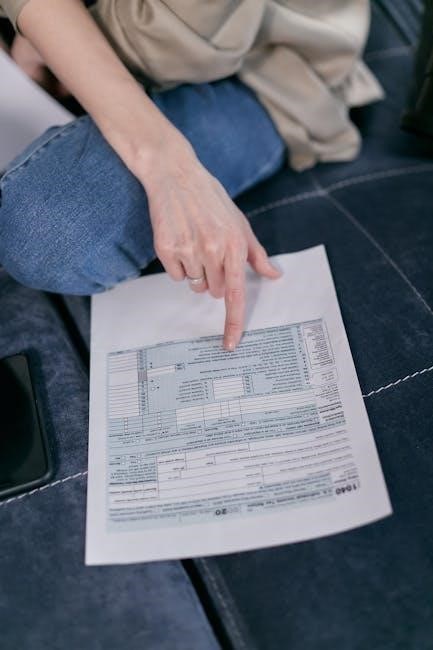
instructions form 8621
Form 8621 is a critical IRS form for U.S. taxpayers with investments in Passive Foreign Investment Companies (PFICs) or Qualified Electing Funds (QEFs). It ensures compliance with specific tax regulations, allowing proper reporting of income, gains, and elections related to these foreign investments.
What is Form 8621?
Form 8621, officially titled Information Return by a Shareholder of a Passive Foreign Investment Company or Qualified Electing Fund, is a specialized IRS form. It is used to report income, gains, distributions, and elections related to investments in PFICs or QEFs. The form is essential for U.S. taxpayers, including expats, who hold shares in foreign mutual funds, hedge funds, or similar pooled investment vehicles. By filing Form 8621, taxpayers ensure compliance with U.S. tax laws, avoid penalties, and maintain control over how their foreign investments are taxed. It is typically filed annually alongside a taxpayer’s federal income tax return.
Importance of Filing Form 8621
Filing Form 8621 is crucial for ensuring compliance with IRS regulations regarding foreign investments. It prevents penalties and ensures proper tax treatment of income, gains, and distributions from PFICs or QEFs. Failure to file may result in penalties, interest, and loss of certain elections. The form enables taxpayers to report accurately and make necessary elections, such as the QEF election, which can simplify tax reporting and reduce liability. Timely filing helps avoid complications and ensures adherence to U.S. tax laws for foreign investment holdings.
Who Needs to File Form 8621?
U.S. citizens, residents, and certain entities must file Form 8621 if they hold shares in a PFIC or QEF. This includes direct or indirect ownership, such as through mutual funds or partnerships. Filers must report income, distributions, and gains from these investments. Additionally, anyone who receives distributions or recognizes gains from PFICs must file. The form applies to U.S. persons with foreign investments meeting PFIC criteria, ensuring compliance and proper reporting of foreign financial activities to the IRS.

Understanding PFIC and QEF
PFICs are foreign corporations generating passive income, like mutual funds. QEFs are PFICs that U.S. shareholders can elect to treat as qualified, simplifying tax reporting.
Definition of PFIC (Passive Foreign Investment Company)
A PFIC is a foreign corporation where at least 75% of its income is passive, such as dividends, interest, or capital gains, and more than 50% of its assets generate passive income. Examples include foreign mutual funds or holding companies. U.S. taxpayers must file Form 8621 if they hold PFIC shares, ensuring compliance with IRS regulations to avoid penalties and properly report income, distributions, and gains.
Definition of QEF (Qualified Electing Fund)
A Qualified Electing Fund (QEF) is a type of Passive Foreign Investment Company (PFIC) that allows U.S. shareholders to elect to report its income annually, avoiding certain PFIC penalties. To qualify, a QEF must meet specific income and asset tests and agree to provide shareholders with detailed financial information. By making a QEF election, taxpayers can report income proportionally, based on their ownership stake, and avoid the complex interest and additional taxes typically associated with PFIC investments, ensuring compliance with IRS regulations.
Key Differences Between PFIC and QEF
A PFIC is a foreign corporation that primarily generates passive income, such as dividends or capital gains, while a QEF is a specific type of PFIC that allows U.S. shareholders to elect to report its income annually. Unlike PFICs, QEFs provide shareholders with detailed financial information, enabling proportional income reporting. PFICs are subject to stringent tax rules, including interest and penalties, whereas QEF elections simplify tax compliance by avoiding these penalties. The QEF election requires annual reporting and transparency, distinguishing it from the broader PFIC classification.

Key Components of Form 8621
Form 8621 requires detailed identification of the PFIC or QEF, including the entity’s name, address, and tax ID. It mandates reporting income, distributions, and gains, with specific calculations for taxable amounts. The form also includes sections for making elections, such as the QEF election, and provides guidance for accurately disclosing financial activities related to foreign investments. Proper completion ensures compliance with IRS regulations and avoids penalties associated with PFIC investments.
Identification of the PFIC or QEF
Form 8621 requires detailed identification of the PFIC or QEF, including the entity’s name, address, and tax identification number. For each PFIC or QEF held, taxpayers must provide accurate information to ensure proper reporting. If multiple PFICs are owned, each must be identified separately. The IRS mandates precise details to maintain compliance and avoid penalties. This step is crucial for accurately tracking and reporting income, distributions, and elections related to foreign investments. Proper identification ensures clarity and completeness in the filing process.
Reporting Income and Distributions
Reporting income and distributions from PFICs or QEFs is essential for compliance with IRS regulations. Taxpayers must report all income, including dividends, interest, and capital gains, as well as distributions received directly or indirectly. Distributions may include cash, property, or reinvested amounts. Accurate reporting ensures proper tax calculation and avoids penalties. The form requires detailed breakdowns of income sources and distribution types, ensuring clarity and adherence to IRS guidelines. Proper documentation and categorization are critical for a compliant filing process.
Calculating Gains and Losses
Calculating gains and losses for Form 8621 involves determining the difference between the sale price and the adjusted cost basis of PFIC or QEF shares. Use the exchange rate on the sale date to convert foreign currency to U.S. dollars. Adjust the cost basis for distributions received, which may reduce the basis. For partial sales, apply the first-in, first-out rule unless otherwise elected. Gains are taxed as ordinary income, while losses may offset gains. Accurate documentation, including sale dates, shares sold, and exchange rates, is crucial. Consulting a tax professional is advisable to ensure compliance and avoid penalties.
Making Elections Under Form 8621
Making elections under Form 8621 is crucial for taxpayers to optimize their tax treatment of PFIC or QEF investments. The QEF election allows inclusion of undistributed income, while other elections may apply to specific situations. These elections must be made timely and in accordance with IRS guidelines to avoid penalties. Proper documentation and adherence to filing deadlines are essential. Consulting a tax professional ensures accuracy and compliance, as incorrect or missed elections can lead to unfavorable tax consequences. Elections are irrevocable once made, so careful consideration is necessary.

Filing Requirements
Form 8621 must be filed annually with your federal income tax return. Attach it to your return and submit by the designated deadline to avoid penalties.
When to File Form 8621
Form 8621 must be filed annually by the due date of your federal income tax return, typically April 15. If you file for an extension, the deadline extends to October 15. Attach Form 8621 to your tax return (or partnership/exempt organization return) and submit both together. Failure to meet the deadline may result in penalties. Ensure timely filing to comply with IRS requirements and avoid costly consequences. Proper submission is crucial for accurate reporting of PFIC-related income and elections.
Where to File Form 8621
Form 8621 must be mailed to the IRS Service Center at the address listed in the instructions. Attach it to your federal income tax return (Form 1040) or, if applicable, to a partnership (Form 1065) or exempt organization return (Form 990). Ensure the form is properly completed and signed. If you are not required to file a tax return, submit Form 8621 directly to the IRS address provided. Failure to file correctly may result in penalties. Always verify the mailing address in the latest IRS instructions for accuracy.
Required Documentation
To complete Form 8621, gather detailed documentation for each PFIC or QEF, including the name, address, and foreign tax identification number. Provide records of income, distributions, and gains related to the investment. Include statements showing ownership percentages and any elections made. Attach copies of relevant financial statements and tax documents. Maintain records to support calculations of gains, losses, and tax liabilities. Ensure all information aligns with IRS requirements for accurate reporting. Proper documentation is essential to avoid errors and potential penalties.
Consequences of Not Filing
Failing to file Form 8621 can result in severe penalties, including fines and interest on unreported income. The IRS may impose a penalty of $10,000 or more for each unfiled form. Additionally, unpaid taxes on PFIC income may accrue interest, leading to further financial burdens. Ignoring filing requirements can also delay or complicate tax refunds. It is crucial to address any missed filings promptly to mitigate these consequences and ensure compliance with IRS regulations.

Elective Elections Under Form 8621
Form 8621 allows U.S. shareholders to make elective elections, such as the QEF election, to optimize tax treatment of foreign investments. Timely elections can provide tax benefits.
Overview of Elective Elections
Elective elections under Form 8621 provide taxpayers with options to influence how their foreign investments are taxed. The QEF election allows shareholders to treat income as earned directly, potentially reducing tax liabilities. Other elections may apply to specific situations, such as qualifying insurance corporations. These elections require careful documentation and adherence to IRS guidelines. Making timely and informed choices can optimize tax outcomes and ensure compliance with regulations. Proper planning and professional advice are crucial to navigate the complexities of these elections effectively.
Qualified Electing Fund (QEF) Election
The QEF election allows U.S. shareholders to treat income from a PFIC as if it were earned directly, bypassing punitive tax rates. To qualify, the fund must agree to provide annual financial information. Shareholders must attach Form 8621 and include their share of the fund’s income, gains, and deductions. This election simplifies tax reporting and avoids the complexities of PFIC rules. Proper documentation and timely filing are essential to benefit from this election and ensure compliance with IRS requirements. Professional guidance is recommended to navigate the process effectively.
Other Elective Elections
Beyond the QEF election, Form 8621 allows for other elective elections that provide tax relief or clarify ownership status. The Purge Election enables shareholders to eliminate PFIC taint by disposing of tainted assets. Additionally, the Deemed Sale Election treats PFIC stock as sold, avoiding certain anti-deferral rules. These elections must be made timely and documented properly to ensure compliance. Consulting tax professionals is crucial to navigate these complex options and optimize tax outcomes effectively while adhering to IRS guidelines. Proper filing ensures these elections are recognized and applied correctly.
Implications of Making an Election
Making an election on Form 8621 significantly impacts tax treatment and compliance. Elections like the QEF or Purge Election alter how income, gains, and distributions are reported, potentially reducing tax liabilities. Timely and accurate elections ensure proper tax deferral or avoidance of punitive rates. Failure to comply may result in penalties or loss of election benefits. Elections are irrevocable once made, so careful consideration and professional advice are essential. Proper documentation is required to support the election, ensuring adherence to IRS regulations and avoiding future disputes or audits.

Calculating Income and Distributions
Accurate calculation of income and distributions from PFICs and QEFs is crucial. This includes ordinary income and capital gains, ensuring correct allocation to avoid penalties and ensure compliance.
Reporting Income from PFICs
Reporting income from PFICs involves identifying and listing each PFIC separately. Include ordinary income, dividends, and gains, ensuring accurate classification. Proper documentation is essential to avoid penalties, with details on foreign taxes paid. Attach Form 8621 to the taxpayer’s return, adhering to filing deadlines and ensuring compliance with IRS regulations. Accurate reporting is crucial for proper tax assessment and avoidance of penalties.
Reporting Distributions from PFICs
Report distributions from PFICs, including dividends, capital gains, and other payouts, on Form 8621. Identify each PFIC, detailing the type and amount of distribution. Properly classify the income and ensure accurate reporting of foreign taxes paid. Attach required documentation to support the reported amounts. Failure to accurately report distributions may result in penalties or delays in processing. Ensure compliance with IRS guidelines by maintaining detailed records and following the form’s specific instructions for disclosure.
Calculating Gain or Loss on Disposition
‘ under the topic ‘instructions form 8621’. The user has provided specific instructions that I must follow carefully.
First, I must ensure that the response is exactly . Not less, not more. I’ll have to count the words once I draft it. Also, the output must be in English, which it will be since the user specified that.
Looking at the provided information, I see that Form 8621 is used to report income and gains from PFICs and QEFs. When calculating gain or loss, it’s important to determine the adjusted basis and sales proceeds. Also, exchange rates and holding periods are factors. Proper documentation is crucial to avoid penalties.
I’ll structure the response to include the steps: determine adjusted basis, calculate sales proceeds, account for exchange rates, and consider holding periods. I’ll also mention the importance of accurate reporting and documentation.
Now, I’ll draft the response, ensuring it’s concise and fits within . Let me write it out:
When disposing of PFIC shares, calculate gain or loss by determining the adjusted basis and sales proceeds. Adjust for any distributions and commissions. Use the applicable exchange rate on the sale date. If held for over a year, apply long-term capital gains rates. Properly document the transaction to avoid penalties and ensure accurate reporting on Form 8621. Maintain detailed records to support the calculations and comply with IRS requirements.
I’ll count the words. Let me see:
When
disposing
of
PFIC
shares,
calculate
gain
or
loss
by
determining
the
adjusted
basis
and
sales
proceeds.
Adjust
for
any
distributions
and
commissions.
Use
the
applicable
exchange
rate
on
the
sale
date.
If
held
for
over
a
year,
apply
long-term
capital
gains
rates.
Properly
document
the
transaction
to
avoid
penalties
and
ensure
accurate
reporting
on
Form
8621.
Maintain
detailed
records
to
support
the
calculations
and
comply
with
IRS
requirements.
That’s . I need to reach 87. I’ll add more details about the importance of accurate reporting and perhaps mention the consequences of not complying.
Let me revise:
When disposing of PFIC shares, calculate gain or loss by determining the adjusted basis and sales proceeds. Adjust for any distributions, commissions, and fees. Use the applicable exchange rate on the sale date. If held for over a year, apply long-term capital gains rates. Accurate reporting is crucial to avoid penalties and ensure compliance. Properly document the transaction, including all adjustments and exchange rate details; Maintain detailed records to support the calculations and comply with IRS requirements for Form 8621 reporting.
Now, counting the words:
When
disposing
of
PFIC
shares,
calculate
gain
or
loss
by
determining
the
adjusted
basis
and
sales
proceeds.
Adjust
for
any
distributions,
commissions,
and
fees.
Use
the
applicable
exchange
rate
on
the
sale
date.
If
held
for
over
a
year,
apply
long-term
capital
gains
rates.
Accurate
reporting
is
crucial
to
avoid
penalties
and
ensure
compliance.
Properly
document
the
transaction,
including
all
adjustments
and
exchange
rate
details.
Maintain
detailed
records
to
support
the
calculations
and
comply
with
IRS
requirements
for
Form
8621
reporting.
That’s . Still need 6 more. I’ll add a sentence about the importance of compliance.
When disposing of PFIC shares, calculate gain or loss by determining the adjusted basis and sales proceeds. Adjust for any distributions, commissions, and fees. Use the applicable exchange rate on the sale date. If held for over a year, apply long-term capital gains rates. Accurate reporting is crucial to avoid penalties and ensure compliance. Properly document the transaction, including all adjustments and exchange rate details. Maintain detailed records to support the calculations and comply with IRS requirements for Form 8621 reporting. Compliance ensures accurate tax obligations and prevents potential audits.
Counting words again:
When
disposing
of
PFIC
shares,
calculate
gain
or
loss
by
determining
the
adjusted
basis
and
sales
proceeds.
Adjust
for
any
distributions,
commissions,
and
fees.
Use
the
applicable
exchange
rate
on
the
sale
date.
If
held
for
over
a
year,
apply
long-term
capital
gains
rates.
Accurate
reporting
is
crucial
to
avoid
penalties
and
ensure
compliance.
Properly
document
the
transaction,
including
all
adjustments
and
exchange
rate
details.
Maintain
detailed
records
to
support
the
calculations
and
comply
with
IRS
requirements
for
Form
8621
reporting.
Compliance
ensures
accurate
tax
obligations
and
prevents
potential
audits.
Oops, that’s . I need to trim it back. Let me remove the last sentence and see.
When disposing of PFIC shares, calculate gain or loss by determining the adjusted basis and sales proceeds. Adjust for any distributions, commissions, and fees. Use the applicable exchange rate on the sale date. If held for over a year, apply long-term capital gains rates. Accurate reporting is crucial to avoid penalties and ensure compliance; Properly document the transaction, including all adjustments and exchange rate details. Maintain detailed records to support the calculations and comply with IRS requirements for Form 8621 reporting.
That’s . To reach 87, I’ll add a bit more about the importance of accurate records.
When disposing of PFIC shares, calculate gain or loss by determining the adjusted basis and sales proceeds. Adjust for any distributions, commissions, and fees. Use the applicable exchange rate on the sale date. If held for over a year, apply long-term capital gains rates. Accurate reporting is crucial to avoid penalties and ensure compliance. Properly document the transaction, including all adjustments and exchange rate details. Maintain detailed records to support the calculations and comply with IRS requirements for Form 8621 reporting. This ensures accurate tax obligations and prevents potential issues during audits.
Counting words:
When
disposing
of
PFIC
shares,
calculate
gain
or
loss
by
determining
the
adjusted
basis
and
sales
proceeds.
Adjust
for
any
distributions,
commissions,
and
fees.
Use
the
applicable
exchange
Recent Updates and Changes
Recent updates to Form 8621 include significant changes under the TCJA, new checkboxes for Qualifying Insurance Corporations added in 2023, and updated instructions in 2024.
Updates to Form 8621 in Recent Years
Recent updates to Form 8621 include the addition of a new checkbox for Qualifying Insurance Corporations as of 2023, aligning with expanded definitions under the TCJA. The IRS has also streamlined reporting requirements for certain distributions and gains, reducing complexity for filers. Additionally, the instructions now clarify thresholds for filing, particularly for taxpayers below specific income levels without distributions. These changes aim to enhance compliance and reflect evolving tax legislation impacting PFIC and QEF reporting.
Impact of Tax Legislation on PFIC Reporting
Tax legislation, such as the TCJA, has expanded the definition of PFICs, potentially increasing the number of foreign corporations classified as PFICs. This has led to broader reporting requirements for U.S. taxpayers. Additionally, updates to Form 8621 now include a checkbox for Qualifying Insurance Corporations, reflecting legislative changes. The IRS has also clarified filing thresholds, particularly for taxpayers below specific income levels without distributions, reducing unnecessary filings. These changes ensure alignment with evolving tax laws and simplify compliance for filers.
Compliance Requirements
Compliance with Form 8621 requires accurate reporting of income, distributions, and gains from PFICs or QEFs. Taxpayers must provide detailed information, including the name, address, and tax identification number of the foreign corporation; Adherence to filing deadlines and proper attachment of the form to the taxpayer’s return are essential. Failure to comply may result in penalties. Recent updates, such as the addition of a checkbox for Qualifying Insurance Corporations, must be followed carefully. Ensuring all information aligns with IRS regulations is crucial for avoiding costly penalties and maintaining compliance.

Common Mistakes to Avoid
- Failure to identify PFICs correctly.
- Incorrect reporting of income or distributions.
- Neglecting to make required elections.
These errors can result in penalties and compliance issues.
Failure to Identify PFIC
One of the most common mistakes is failing to identify whether a foreign corporation qualifies as a PFIC. A PFIC is defined as a foreign corporation where 75% or more of its gross income is passive income, or 50% or more of its assets are passive assets. Taxpayers often overlook this classification, leading to incorrect reporting. Proper identification requires analyzing the corporation’s income and asset composition. Failure to do so can result in missed filing requirements, incorrect tax calculations, and potential penalties. Understanding the PFIC definition is crucial to ensure compliance with IRS regulations. Always review the specific thresholds and tests to avoid this error.
Incorrect Reporting of Income
Incorrect reporting of income from PFICs or QEFs is a common mistake. Taxpayers often fail to accurately report all types of income, including distributions, gains, or losses. This can occur due to misunderstanding what constitutes reportable income or miscalculating amounts. For instance, distributions from PFICs may be taxable, and gains from sales must be properly categorized. Errors in reporting income can lead to underpayment of taxes, penalties, and compliance issues. It is essential to carefully review all income sources and ensure accurate reporting to avoid IRS scrutiny and potential fines. Always cross-verify calculations with Form 8621 instructions.
Neglecting to Make Required Elections
Neglecting to make required elections on Form 8621 can lead to severe consequences, including penalties and unfavorable tax treatment. Taxpayers must make timely and accurate elections, such as the QEF election, to ensure compliance with IRS regulations. Failure to do so may result in default tax treatment, which can significantly increase tax liabilities. Additionally, missing deadlines or omitting required information can trigger audits and fines. It is crucial to carefully review Form 8621 instructions and seek professional advice to ensure all elections are properly made and documented. Proper compliance avoids costly errors and ensures optimal tax outcomes.

Best Practices for Filing
Consult a tax professional, maintain accurate records, and ensure timely submissions. Carefully review IRS instructions and double-check all entries before filing to avoid errors and penalties.
Seeking Professional Advice
Consulting a tax professional is highly recommended when dealing with Form 8621, as PFIC reporting involves complex rules and calculations. A qualified expert can guide you through the process, ensuring compliance with IRS regulations and optimizing your tax strategy. They can help accurately report income, distributions, and elections, minimizing the risk of errors or penalties. Professional advice is especially crucial for understanding QEF elections and navigating the nuances of foreign investment tax implications. This expertise provides peace of mind and helps avoid costly mistakes.
- Expertise in IRS regulations
- Accurate form completion
- Optimized tax strategies
Keeping Accurate Records
Maintaining detailed records is essential for accurately completing Form 8621. Keep documentation of your PFIC or QEF investments, including purchase dates, income statements, and distribution details. Organize records of elections made, such as QEF or other optional choices. This ensures compliance with IRS requirements and simplifies the filing process. Accurate records also help prevent errors and penalties during audits. Consider using digital tools to track and store your investment information securely.
- Track investment details and income
- Document all elections and distributions
- Organize records for easy access
Understanding Filing Deadlines
Form 8621 must be filed annually with your federal income tax return, typically by April 15th. If you request an extension, the deadline is October 15th. Attach Form 8621 to your Form 1040 or applicable return. Missing the deadline may result in penalties or delays in processing. Ensure timely submission to comply with IRS regulations and avoid unnecessary complications. Properly tracking and meeting these deadlines is crucial for maintaining compliance with PFIC and QEF reporting requirements.
- File Form 8621 by April 15th or extended deadline
- Attach to Form 1040 or applicable tax return
- Missing deadlines may lead to penalties

Case Studies and Examples
Form 8621 instructions include practical examples, such as reporting income from a PFIC, making a QEF election, and calculating gains on disposition, aiding taxpayers in real-world scenarios.
Example 1: Reporting Income from a PFIC
When reporting income from a PFIC using Form 8621, identify the foreign corporation, including its name, address, and tax identification number. Calculate the income earned during the tax year, including distributions and gains. Report these amounts on the appropriate lines of the form, ensuring accurate classification of ordinary income and capital gains. Attach Form 8621 to your tax return and file by the specified deadline to avoid penalties. This example illustrates the step-by-step process for compliance with PFIC income reporting requirements.
Example 2: Making a QEF Election
Making a Qualified Electing Fund (QEF) election involves reporting your share of the QEF’s income annually. Identify the QEF, calculate its income, and report it on Form 8621. Attach the form to your tax return and file by the deadline. This election allows you to avoid PFIC rules by treating the income as ordinary income. Proper documentation ensures compliance, avoiding penalties and taxes on deferred income. This example demonstrates how to effectively make and report a QEF election to align with IRS requirements and maintain tax efficiency.

Additional Resources
Example 3: Calculating Gain on Disposition
To calculate the gain on disposition of a PFIC or QEF, start by determining the adjusted basis, including purchase price and any fees. Adjust for distributions received. Find the fair market value (FMV) at disposition. Gain is FMV minus adjusted basis. Consider elections made, such as QEF, which affects income reporting. Differentiate between short-term and long-term holdings for tax rates. Claim foreign tax credits if applicable using Form 1116. Maintain precise records of transactions. Stay informed on IRS updates and consider professional advice for accurate reporting on Form 8621.
Leave a Reply
You must be logged in to post a comment.